LEARNING HOW TO MAKE FLOWERS SYSTEMATICALLY

How to “make flowers” with Butterfly Knives
An important technique found in many weapons, like the Butterfly Knives, the saber and the spear, is known in Chinese as “khuen fa” (Cantonese), which may be roughly translated as “making flowers”.
There are different variations of this technique, and it is implemented in patterns like “Double Butterflies Flying” and “Big Blossom of Plum Flowers”. Amongst the many combat applications of the technique are to attack an opponent continuously, to break out of an ambush by many attackers or to deflect countless “flying weapons” thrown by opponents.
This video series shows how this technique is performed. It needs much skill to perform it well.
Khuen Fa or Making Flowers
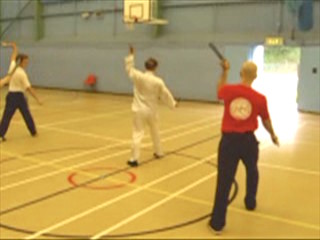
This is an important technique known in Chinese as “khuen fa” (Cantonese), roughly translated as “making flowers”, and is found in many weapons, like the Butterfly Knives, the saber and the spear. The technique is performed slowly so that participants can follow more easily. Notice the crossing of arms. Here the right arm crosses the left arm after the left arm has made a chopping movement.
Increasing the Speed of Making Flowers
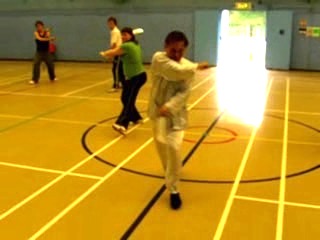
“Making Flowers” is performed moving forward in one direction and then turning around to move in the other direction. As a rough guide, the movements here are cross arms, right chop, reversed right chop, left chop, and repeat. As you become more familiar with the movements, increase their speed.
Different Versions of Making Flowers
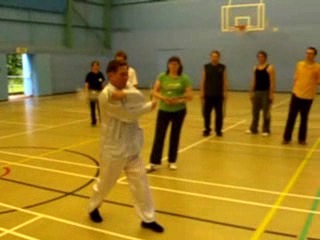
There are different versions of “making flowers”. The version used in this set, as demonstrated in the previous two video clips, is from the lineage of Grandmaster Choe Hoong Choy of Wing Choon Kungfu. The version shown in this video clip is from the lineage of Uncle Righteousness of Hoong Ka or Southern Shaolin. In Grandmaster Choe's version, the two Butterfly Knives strike one after another. In Uncle Righteousness' version, the two Butterfly Knives strike at the same time.

To help the participants acquire this technique, the mechanics of making flowers are analysed and demonstrated. There are no hard and fast rules, but a rough guideline can be right chop, reversed right chop and left chop, or left chop, reversed left chop and right chop. The arms can be crossed at the right side, the left side or both sides.
Practicing the Technique of Making Flowers
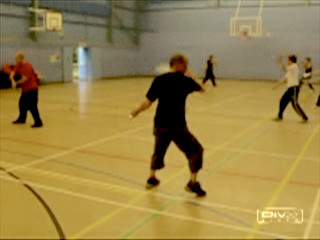
This video shows participants practicing the technique of “making flowers”. Initially they do not worry about “crossing arms”. They just get the swing of the technique smoothly. The mechanics of Sifu Mark's movements here is continuously repeating right chop, reversed right chop, left chop, reversed left chop. When these movements are smooth, “crossing arms” can be added.
Training of Energy and Mind
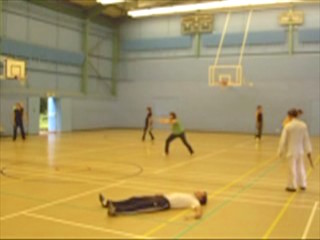
In our school, every lesson is a training of energy and mind. In other words, no matter what we train, whether it is form practice, combat application or force development, it is chi kung and meditation. Here, after practicing how to “make flowers”, practitioners enjoy a chi flow. Martin is enjoying himself on the floor, Nicky is flowing in weapon patterns, while the others are swaying about.
Learning to Make Flowers Systematically with Butterfly Knives from Wong Kiew Kit on Vimeo.
LINKS
Review of UK Summer Camp 2007 Weapon Course
- Introducing the Butterfly Knives
- Fierce Tiger and Moon-Gazing Rhinoceros
- How would you Counter a Spear Thrust?
- Counters against Chops and Sweeps of Other Weapons
- Butterfly Knives Against a Saber
- The Secret of Performing Butterfly Knives with Force and Speed but Without being Tired
- Yin-Yang Butterfly Knives and Close-Combat Applications
- Some Interesting Applications of Butterfly Knives Held in Reverse
- Combat Training with Weapons Must be Injury Free
- How do you Release your Butterfly Knives from being Locked?
- Learning to Make Flowers Systematically
- Combat Applications of Double Butterflies Flying
- Human-Character and Cross-Road are Found Here
- Kungfu Training and Mental Clarity
- Learning the Combat Applications of the Butterfly Knives against Other Weapons
- The Benefits of Combat Training with Classical Weapons
- From Slow and Systematic to Fast and Spontaneous
- First-Class Kungfu Calls for Great Skills and Techniques
